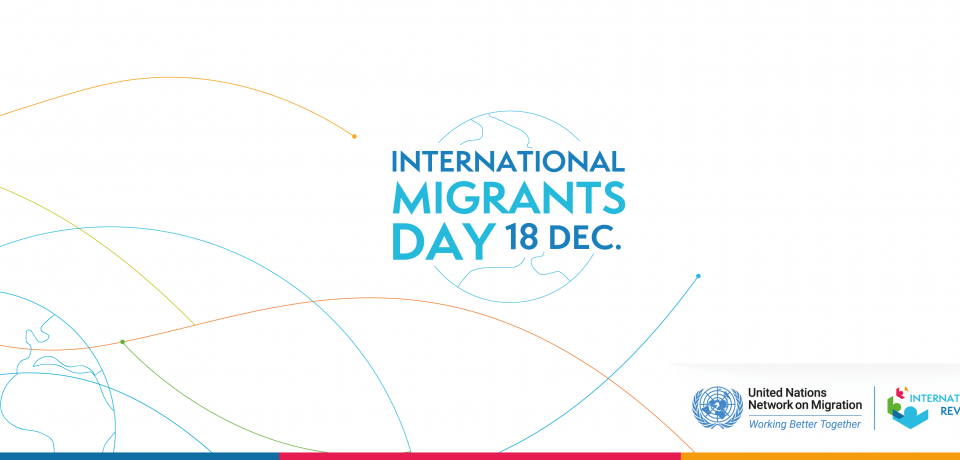UN Network on Migration: International Migration Needs More Than Just Collective Attention; It Needs Collective Action
Related Sustainable Development Goals and Global Compact for Migration Objectives
DATE: 17 DEC 2021
Geneva - On the occasion of International Migrants Day, the United Nations Network on Migration calls on the international community to strengthen collective action to protect migrants’ lives, reduce their vulnerabilities and maximize the benefits of safe, orderly and regular migration.
As the international community prepares for the first International Migration Review Forum (IMRF) at the United Nations General Assembly next May, the Network recalls the spirit of solidarity and international cooperation underpinning the Global Compact for Safe, Orderly and Regular Migration (GCM) recognizing that no state can address migration alone. The Network encourages all states and stakeholders to make concrete commitments ahead of the Forum, in pursuit of the GCM objectives and grounded in its guiding principles.
In the three years since the adoption of the GCM, some states have taken important steps to protect migrants through the use of non-custodial alternatives to immigration detention, visa extensions, regularization, and access to essential health services. These measures have facilitated states’ commitments to protect the rights, dignity and well-being of migrants, while preventing some of them from falling into irregular status.
Some states have also reformed labour migration rules and procedures to ensure that recruitment is fair, and that migrant workers enjoy decent work. Others continue to tackle the impacts of COVID-19 by ensuring non-discriminatory vaccine allocation and distribution, and the continued employment of migrant workers -- many of whom contribute significantly to health systems and the care economy, agriculture, and other sectors vital to sustainable development -- including by ensuring more flexible pathways for regular migration.
However, greater collective action is needed to address the ongoing human cost of policies and practices that continue to place migrants in situations of vulnerability. Since December 2018, nearly 14,000 migrants have lost their lives in attempting to reach new destinations. Many migrants have been stranded or forcibly returned without due regard to their rights, safety, and well-being; many, especially those who are undocumented, have been denied access to basic healthcare, including COVID-19 vaccinations, testing and treatment. Today, more girls and boys are on the move than ever before; far too many are growing up deprived of an education, with COVID-19 further limiting their access to learning opportunities.
“COVID-19-related border closures and the attendant economic crisis have led to extensive job losses for migrant workers globally, with a disproportionate impact on women, who have even more limited income security and social protection and who continue to face wage discrimination,” said António Vitorino, Director-General of the International Organization for Migration and Coordinator of the UN Network on Migration.
“The current politicization of migration and dehumanization of migrants, seen in many contexts the world over, fuels xenophobia, undermining our commitment to building more resilient, inclusive societies and making a stronger multilateral system,” he added.
As we mark International Migrants Day and celebrate the third anniversary of the adoption of the GCM, the UN Network on Migration urges states and all stakeholders to step up international cooperation and strengthen global, regional, bilateral, national and local partnerships for safe, orderly and regular migration, including by:
- Recognizing the overarching obligation to respect, protect and fulfil the human rights of all migrants, regardless of their migration status;
- Maximizing the positive contribution of migrants and diasporas as development actors with full access to national health, education, social protection systems and decent work;
- Accelerating the implementation of the 2030 Agenda for Sustainable Development by addressing the adverse drivers and structural factors that hinder people from building and maintaining sustainable livelihoods in their countries of origin, and thus compel them to seek a future elsewhere;
- Opening avenues for regular migration as a viable alternative to precarious or irregular migration and reliance upon migrant smuggler networks;
- Dismantling organized criminal groups engaging in migrant smuggling and human trafficking, and disrupting their business model and related financial flows that sustain their activities, while protecting their victims, including through non-penalization and access to justice;
- Partnering with migrants and all relevant stakeholders, including children and youth, in the implementation, follow-up and review of the GCM;
- Making concrete and actionable pledges in advance of the IMRF to act towards the tangible realization of GCM objectives and commitments, including through the provision of financial and technical assistance, and by increasing support to the Migration Multi-Partner Trust Fund.
As we head towards the first global review of the GCM, we must strengthen our collective action and demonstrate the value of international cooperation in forging collective solutions to work towards safe, orderly and regular migration.
About the United Nations Network on Migration
The United Nations Network on Migration was established to ensure effective, timely and coordinated system-wide support to Member States in their implementation, follow up and review of the Global Compact for Safe, Orderly and Regular Migration. While the Network’s mandate is focused on migration, States are called to also implement these recommendations as relevant to refugees and asylum-seekers and to protect the human rights of everyone equally, regardless of migration status.
For more information please contact:
UN Network on Migration (secretariat)
Florence Kim
fkim@iom.int +41797480395
This statement was originally posted on the UN Network on Migration's website.
